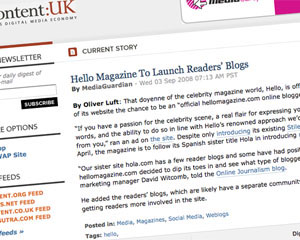Last week LA Times, one of the biggest employers of journalists in the US, announced that it would be dispensing with the services of 150 of them as part of a total 250 job losses at the paper.
Yesterday afternoon it emerged that two more journalists would likely be leaving the LA Times, but not as a direct result of the editorial cuts.
According to LA Observed, Pulitzer Prize winning investigative reporters Charles Ornstein and Tracy Weber will be leaving the paper later in the summer to join the not-for-profit investigative start up ProPublica.
“It’s another big morale blow in the newsroom, which used to be a place where journalists aspired to reach and stay to do their best work. With new deep cutbacks coming and [LA Times owner] Sam Zell’s outbursts making many of the best journalists feel the Times’ commitment to serious news is precarious, it’s no longer surprising to see stars like Ornstein and Weber flee,” wrote Kevin Roderick.
Last week’s editorial staff cuts, which amounts to roughly 17 per cent of the employees, will be spread between the print newsroom and The Times’ web operations.
Those cuts led to this fascinating quote from Times editor Russ Stanton:
“You all know the paradox we find ourselves in,” he wrote said in a memo to the staff. “Thanks to the Internet, we have more readers for our great journalism than at any time in our history. But also thanks to the Internet, our advertisers have more choices, and we have less money.”
One hundred and fifty losses job losses against two hires doesn’t really make a great case for the internet as a growth medium for the employment of journalists, but nonetheless the growth of ProPublica and its journalistic modus operandi online marks a neat stab at Stanton’s paradox.
The ProPublica site will be fully operational later this year and plans to have almost 30 investigative reporters working on in-depth stories (it helps that self-made billionaire Herb Sandler has set up the site with a donation of $10m a year from his foundation and that it’s under the watchful eye of former WSJ editor Paul Steiger).
ProPublica will conduct investigations, largely online, in areas of significant public interest. It will also use TV documentaries to reveal on that large canvas issues that will be followed up extensively online.
It’s first major project, an investigation into US-backed Arabic language TV network Alhurra, ran on 60 Minutes two weeks ago.
Zell say that newspapers have to slim down and become more economically viable. Newspaper’s are about money, not news, that’s fairly self-evident. Little wonder then that Charles Ornstein and Tracy Weber decided to walk and pursue their investigations elsewhere.
What awaits them at ProPublica?
A philanthropic backer claiming no editorial interference. No desire for profits. No ads on the site. Where almost all resources will be poured into journalism (what no free CD give away?).
The journalistic equivalent to Willy Wonka’s ‘golden ticket’, it seems.
